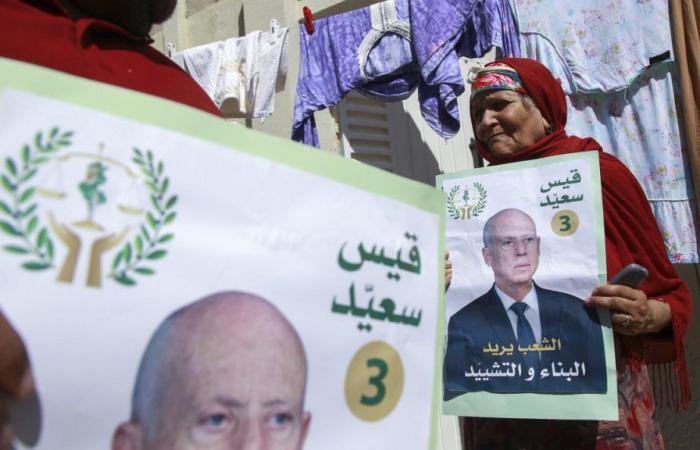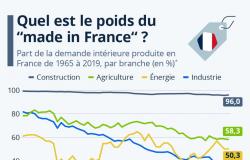In Tunisia, President Kaïs Saïed will only have two opponents in the election on Sunday October 6, where he will seek a second term. All other candidates were eliminated. And among the two surviving candidates, one is in prison. Why are the Tunisians, who overthrew their dictator in 2011, not protesting against the wave of arrests falling on opponents, lawyers and journalists? Vincent Geisser is a researcher at the CNRS. In Aix-en-Provence, he directs the Institute for Research and Studies on the Arab and Muslim Worlds (Iremam).
RFI : There are only two candidates facing Kaïs Saïed, one of whom is in prison. Is next Sunday’s vote a foregone conclusion?
Vincent Geisser : Yes, we can say that it is a foregone conclusion to the extent that the president is not participating in a plebiscite, but rather in a manifestation of presidential authoritarianism, of his very personal, very presidentialist conception of power, not even really in an attempt at an electoral showcase to legitimize the regime, which is what Ben Ali did.
Until a month ago, almost no one knew MP Ayachi Zammel, a 47-year-old business leader who created the small liberal party Azimoun. But now that this candidate is in prison, many Tunisians want to vote for him. Could he create a surprise? ? Could he become a sort of Bassirou Diomaye Faye [le nouveau président sénégalais] Tunisian style ?
Create a surprise, yes, perhaps by his publicity, by the fact that he becomes a bit, excuse me for the term, a sort of “electoral martyr”, that is to say that he is the name which stands out the most, although you say it very well, he was totally unknown. Because there were still three challengers who were banned, who were on the contrary extremely well-known figures in the Tunisian political spectrum at the time of Ben Ali, but especially at the time of democratization. So, Ayachi Zammel has become the symbol of a sort of “electoral resistance” to Kaïs Saïed, but resistance in quotation marks… So there will be no surprise. Mr. Kaïs Saïed completely controls the vote. Will we be in 90%? In 80%? In any case, there will be no electoral surprise, but rather presidential unanimity. At least, that’s what the president represents: the idea that he is in communion with the people, that elections serve no purpose. Because, it must be said: Kaïs Saïed spends his time devaluing the principle of parliamentary democracy. He doesn’t believe in it and these elections are a further step in what he calls ” the recovery company » of Tunisia in the face of a political class that he considers corrupt.
More than 70 opposition figures are in prison, several journalists too, such as Mourad Zeghidi, and also the famous lawyer Sonia Dahmani. She was arrested in the premises of the Maison de l’Avocat during a live broadcast by our France 24 colleagues. Why are the Tunisians who led the 2011 revolution allowing this wave of repression to take place ?
There is a first aspect, which is that Tunisians were sort of fed up and even angry with the symbols of Tunisian democracy. They consider that these Democrats, who emerged after 2011, betrayed them. So they joined. This is why many Tunisians supported Kaïs Saïed’s coup d’état of 2021. As a reminder, on July 25, 2021, Kaïs Saïed took over all executive, legislative and judicial powers. And the big surprise is that many people approve, including the union – which is now in opposition to Kaïs Saïed – of the General Labor Union of Tunisia, the UGTT. And so, from this point of view, why are Tunisians not so opposed to what is happening today? It’s because they don’t believe in the opposition and the Democrats who sat between 2011 and 2021. That’s the first phenomenon. The second phenomenon, which is perhaps more recent and which extends over the last six months or this last year, is that a climate of fear, of self-censorship, not to say even of monitoring. And the Tunisians are starting to be afraid again. We thought it would be an achievement of the revolution. We thought that at least this climate of fear that Tunisia had experienced under the Ben Ali dictatorship would not return. However, we see that Tunisians are even more afraid and are even more cautious than at the time of Ben Ali. Especially since there is a very strong conspiracy, a very strong conspiracy. Every day, all the president’s speeches accuse or point to a foreign conspiracy. Anyone who has contact with foreign journalists or foreign NGOs is suspected of conspiring against the president. I would say that the Tunisians are resigned. We do not know if they still massively support President Kaïs Saïed, but in any case, Tunisian citizens are marked by a feeling of general resignation.
In Algeria, Abdelmadjid Tebboune was just re-elected a month ago with the support of the army. Are we witnessing the same phenomenon today in Tunisia with Kaïs Saïed ?
Tunisians, or certain observers – foreign or Tunisian – even have a formula: they speak of “ Algerianization » of the Tunisian political scene. This refers to two aspects: first, the very strong rapprochement between Tunisia and Algeria. Algeria becomes Tunisia’s big brother, while Tunisia was very balanced in its relations with other Arab countries – today, it is really a Tunisian-Algerian or Algerian-Tunisian rapprochement which is very marked; and then the second thing is the resemblance of the two processes…
… with the same support of the Tunisian army, as Abdelmadjid Tebboune has the support of the Algerian army ?
On July 25, 2021, after the coup d’état, it is clear that the vast majority of Tunisian army officers supportedKaïs Saïed, but with a contract: put the country back to work and restore order to the country. The army adhered to the narrative of Kaïs Saïed which was to say that the democrats were corrupt, had disorganized Tunisia and were maintaining disorder. Except that today, Kaïs Saïed’s promises in terms of a return to order have not been kept. On the contrary, Tunisia is fragile on the economic level, on the social level, it is singled out by many international NGOs… And there is a question about the positioning of the army. We thought that the army, since this contract had not been kept, would react and in particular would disavow Kaïs Saïed. This is not the case at the moment, but we cannot say that she approves of it either. She would probably have liked these elections to take place in a more transparent manner, perhaps not democratically, but in a more reasonable manner, with a semblance of a democratic electoral showcase. This is not the step. So, I wouldn’t say that we are in quite the same position as theAlgeria. Firstly because the Tunisian army is not as strong as the Algerian army, it has never controlled power as it did in Algeria for more than 50 years. The only thing in common is that she actually supported the coup d’état and that she has supported Kaïs Saïed until today. But a question mark in the army: it seems that some voices are starting to wonder if he will be able to do the job of maintaining order in the country. The Tunisian army’s concern is order. And if Kaïs Saïed, through his conspiratorial and conspiratorial speeches, were to threaten this order, and above all, were to have such a bad image, including vis-à-vis his foreign partners, the army would make a decision. But we are not there yet.
Also readPresidential election in Tunisia: in Bizerte, supporters campaigning for a head of state with little presence on the ground






